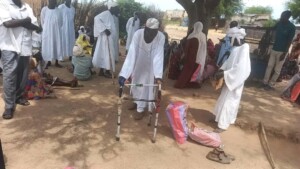OCHA: Two cholera cases recorded in Omdurman
According to the Sudanese Ministry of Health and the World Health Organisation (WHO), 323 suspected cholera cases, including 10 deaths, were reported in Blue Nile state, Sennar and Khartoum between end August and 22 October.
The first case was detected on August 28, the UN Office for the Coordination of Humanitarian Affairs in Sudan says in its latest Sudan Situation Report. Two of the cases were recorded in Ombadda locality in Omdurman, the twin-city of Khartoum.
 Suspected cholera cases in Khartoum (UN OCHA)
Suspected cholera cases in Khartoum (UN OCHA)
According to the Sudanese Ministry of Health and the World Health Organisation (WHO), 323 suspected cholera cases, including 10 deaths, were reported in Blue Nile state, Sennar and Khartoum between end August and 22 October.
The first case was detected on August 28, the UN Office for the Coordination of Humanitarian Affairs in Sudan says in its latest Sudan Situation Report. Two cases were recently recorded in Ombadda locality in Omdurman, the twin-city of Khartoum.
On October 6, humanitarian partners in Sudan launched the Cholera Readiness and Response Plan, that targets 2.5 million people in eight high-risk states (Blue Nile state, Sennar, El Gedaref, Kassala, El Gezira, White Nile state, Khartoum, and River Nile state).
An oral cholera vaccine campaign launched on 11 October is ongoing, targeting 1.6 million people in high risk communities in Blue Nile and Sennar states. The aim of the campaign is to contain the outbreak and prevent its spread to neighbouring states.
Risk assessment
Sudan has been facing a continuous surge of acute watery diarrhoea/suspected cholera cases since 2016.
The current outbreak was reported following recent heavy rains and flooding in 17 out of 18 states across the country. As a result of the flooding, the country reported widespread damage to infrastructure, thus more cholera cases can be expected in the future.
The government swiftly responded to the detection of cases and necessary control measures are being implemented by national authorities, with support from partners, to contain the outbreak.

Challenges
Despite the progress made in response, humanitarian actors face many challenges. More trainings are needed and registration tools, guidelines and protocols for surveillance are weak. Health education and infection prevention at cholera treatment centres need to be improved to prevent the spread of cholera. Cleaning tools, equipment, and protective clothes are also needed for cleaning campaigns.
In addition, resources for cholera response in Sudan and preparedness in high-risk states is currently a major challenge, according to the Sudanese Health Ministry. More efforts and funding are needed to address gaps in the areas of vector control, environmental sanitation and water chlorination.
Lack of funding is likely to affect the response, with the opportunity of preventing new cases, averting deaths, and saving time and resources potentially lost, OCHA states.
‘Watery diarrhoea’
During the 2016-2017 cholera epidemic, the Sudanese government headed by President Omar Al Bashir, and international organisations as well, consistently referred to cases suspected to be cholera as ‘acute watery diarrhoea’, in spite of pathological evidence (according to WHO standards) of cholera.
The new government, formed in early September, immediately acknowledged the disease after the first cases were recorded in Blue Nile state. The new Minister of Health visited cholera patients in El Roseires Hospital in the state on September 13.
Follow #CholeraInSudan, #ألكوليرا_السودان
Radio Dabanga’s editorial independence means that we can continue to provide factual updates about political developments to Sudanese and international actors, educate people about how to avoid outbreaks of infectious diseases, and provide a window to the world for those in all corners of Sudan. Support Radio Dabanga for as little as €2.50, the equivalent of a cup of coffee.












 and then
and then